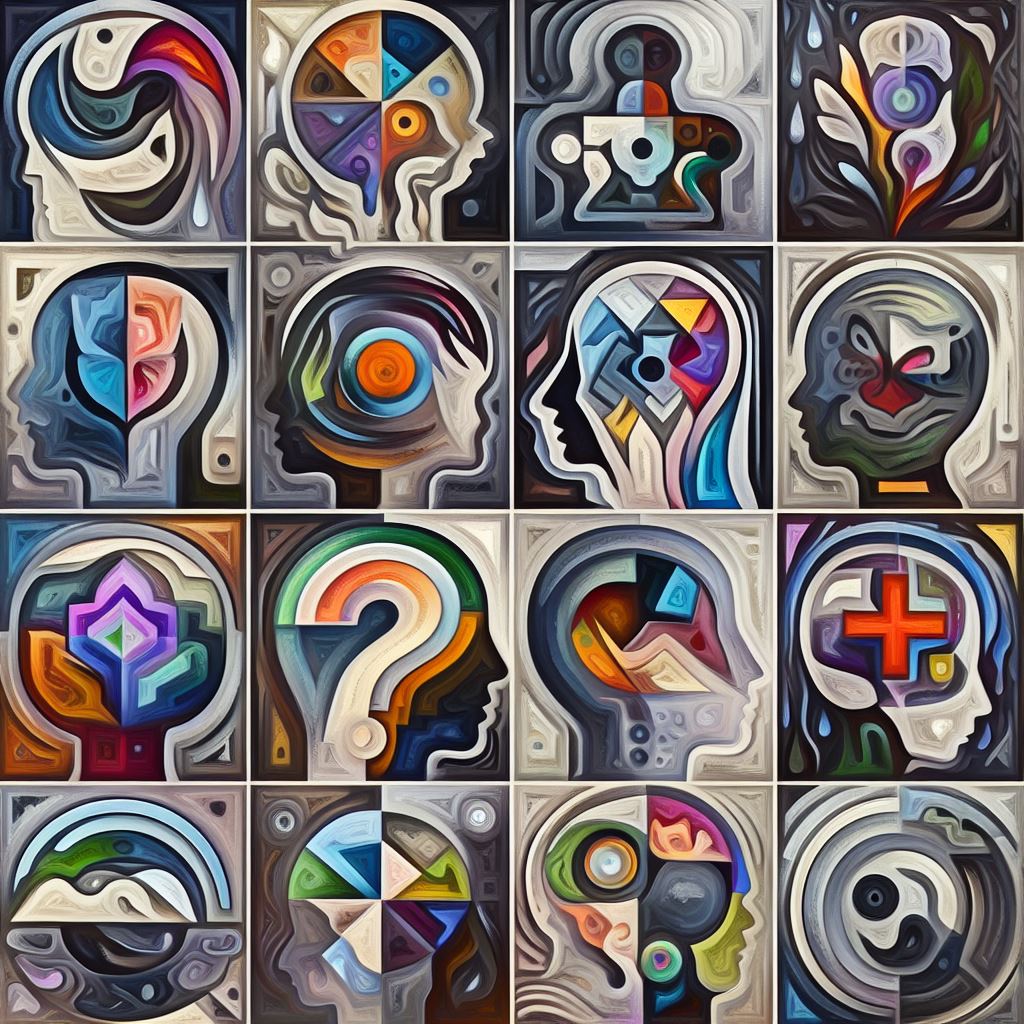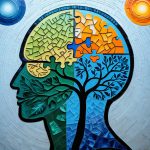When someone is struggling with mental health problems there are several signs that can be both felt by the person (from the “inside”) and observed (from the “outside”). These most typically negatively change how a person thinks, feels, and behaves.
Table of Contents
What is a Mental Disorder – Definition
Defining what is a disorder is harder than it may seem at first. Sometimes people clearly articulate that something is not okay, and they want to change it. Sometimes, however, some behaviours and feelings, even if they seem odd, are harmless and functional. For instance, if someone is biting their nails but it causes no distress to them or anyone else around them, should we label it as a “disorder”? Technically we could say it is a Body-focused repetitive behaviour with known treatments, but pathologizing this may not be beneficial for anyone.
Let’s see the definition of a mental disorder, as defined by the diagnostic and statistical manual.
The Three Signs of Mental Disorders
- Clinically Significant Disturbance. As with our example above, the person experiencing disturbances in cognition (thoughts), emotion regulation, or behaviours that are just minor or occasional, but are significant and have a negative impact on their life.
- Reflecting Dysfunction. The experienced problems are a result of dysfunction in psychological, biological, or developmental processes that underlie mental functioning. This means that even if the person does not believe something is not right, their behaviours are not functioning well in different contexts.
- Associated with Distress or Disability. Mental disorders lead to significant distress or disability in multiple areas of life, such as social interactions, work, or daily activities.
If you think you would benefit from talking to a psychologist, you can book a psychologist online.
Do the mentally ill know they are ill?
This question comes up often, mostly from family members or friends. The short answer is that generally yes, but there are exceptions.
Most mental disorders are unpleasant and troublesome for the sufferers, and they are actively trying to “get rid of it”. Depressive disorders and anxiety disorders are good examples: we feel either really down and sad, or really worried, and neither of them is pleasant (in other words, the symptoms and thoughts are egodystonic, not in line with the person’s values and goals).
However, people with personality disorders may think and feel that their thoughts and behaviours are normal and nothing needs to change (in some cases, they might feel others need to change). We refer to this as egosyntonic, which means that the perceived thoughts and behaviours are in line with their own values. The most common examples are personality disorders and the manic phase of bipolar disorders. However, with bipolar disorder, after the manic episode wears off, the person generally regrets their behaviours during the episode, and they have insight into their own difficulties, and generally seek help.
In the case of personality disorders, at least some aspects of the disorders feel so “natural” to the sufferer that they do not think anything is wrong with their thoughts or behaviours. This makes treatment especially difficult, because most, if not all, interventions require the person to be able to identify the problems to be able to change them. In this regard, borderline personality disorder (BPD) is at least partially egodystonic, as they can identify that their emotions and behaviours are often damaging to them or their loved ones. This recognition can help seek treatment for BPD, such as DBT. We also offer CBT therapy in Sydney, which is effective for a wide range of mental health problems.
Two Symptoms That Are Not Considered a Mental Disorder
- Expectable or Culturally Approved Responses. In this regard, the most common example is grief. Normal grief and sadness after the death of a loved one, for example, are considered normal and not a mental disorder. In other words, feeling sad when something sad happens is a common and culturally accepted response. It does not mean we would not benefit from talking to someone about our sadness, but it does mean that this sadness is a normal response to what happened.
- Socially Deviant Behaviour. Behaviours that are generally considered socially deviant, such as unusual political, religious, or sexual preferences, are not mental disorders on their own. However, if these preferences or behaviours result from a dysfunction in an individual’s psychological processes, then they may be considered a mental disorder. This is a challenging problem for psychologists, as it is not often obvious what is a result of a dysfunction. Assessing for mental disorders when someone wants to undergo transformative surgeries is important.
Overall, the presence of significant and disruptive disturbances in thoughts, emotions, or behaviours, stemming from underlying psychological dysfunction and leading to distress or disability, is a sign of a mental disorder.
At the same time, normal reactions to common stressors, culturally accepted behaviours, and social deviance not caused by psychological dysfunction are generally not considered mental disorders.
What are the 5 Warning Signs of Mental Illness?
Identifying the warning signs of mental disorders can help with early intervention and support. While the symptoms of mental illnesses can vary widely depending on the specific condition, here are five general warning signs that may indicate the current presence of a mental health issue:
Changes in Mood and Emotions. Persistent and extreme mood swings, such as prolonged periods of sadness, irritability, or apathy. Rapid changes in emotional responses, like increased anger or aggression, or switching between positive and negative emotions quickly (often referred to as emotion dysregulation).
Social withdrawal, sleep problems, lack of self-care. Often associated with significant changes in sleep patterns, such as insomnia or excessive sleeping. Decline in personal hygiene and self-care. Difficulty concentrating or making decisions.
Unexplained physical complaints, such as headaches, stomachaches, or unexplained digestion problems. Noticeable, often quick changes in weight or appetite.
Disorganised thinking or difficulty processing information. Not being able to follow conversations, movies, books. Paranoia or delusional beliefs about self or others. Inability to distinguish between reality and delusions or hallucinations.
Increased use of alcohol or drugs, often used to cope with distress. Neglect of responsibilities, such as work or family, due to substance use.
A comprehensive assessment by a mental health professional is essential for an accurate diagnosis.
What are the 7 Early Signs of a Mental Disorder?
Here we collect a bit more comprehensive list of warning signs that may suggest that someone is or going to struggle with a mental disorder.
Persistent Changes in Mood. Frequent and intense mood swings, such as prolonged periods of sadness, anxiety, or irritability, often beyond what one would consider typical emotional fluctuations.
Behavioural Changes. Noticeable alterations in behaviour, including changes in social interactions, withdrawal from loved ones, or significant disruptions in daily activities and responsibilities.
Cognitive and Thought Disturbances. Symptoms like disorganised thinking, racing thoughts, hallucinations, delusions, or difficulty in focusing or concentrating. Some of these become obvious in childhood and early adolescent years.
Emotional Dysregulation. Intense emotional responses that are difficult to manage or control, lead to outbursts, anger, or impulsive behaviours.
Changes in Sleep and Appetite. Significant disruptions in sleep patterns, such as insomnia or hypersomnia, as well as changes in appetite, resulting in weight loss or gain.
Suicidal or Self-Harming Thoughts or Behaviours. Thoughts of self-harm, suicide, or attempts to harm oneself. While not a mental disorder, this is a critical sign that requires immediate attention.
Substance Abuse. A reliance on alcohol or drugs (including prescription medication) as a means of coping with emotional distress or symptoms, or an inability to control the use of substances.
It’s important to emphasize that mental disorders are highly diverse, and each has its own unique set of diagnostic criteria and symptoms. Additionally, not everyone with a mental disorder will exhibit all these signs, and some individuals may experience different or additional symptoms specific to their condition.
Please note that this blog post by Personal Psychology is not intended to provide professional advice. If you or someone you know is experiencing mental health difficulties, it is important to seek help from a qualified healthcare professional.





